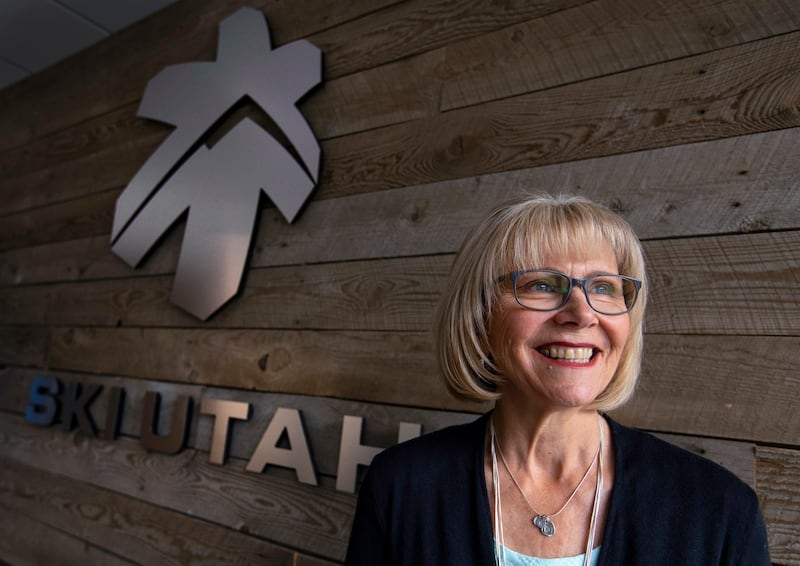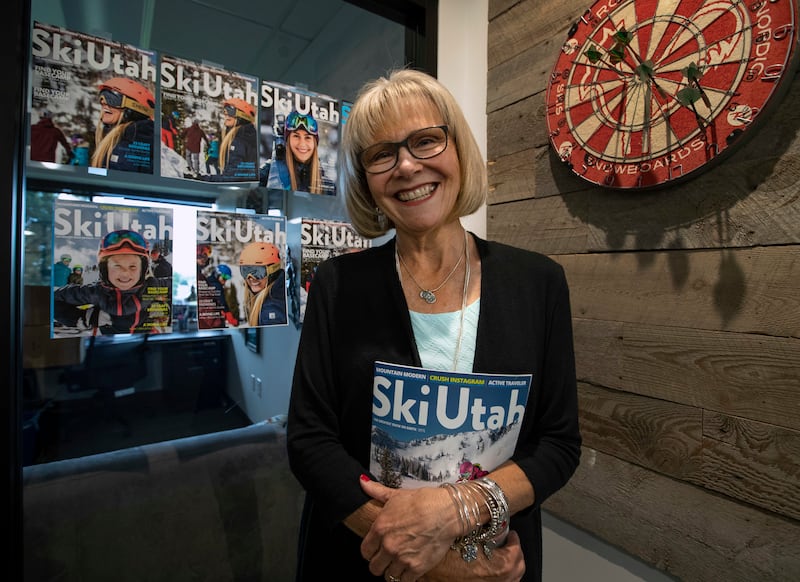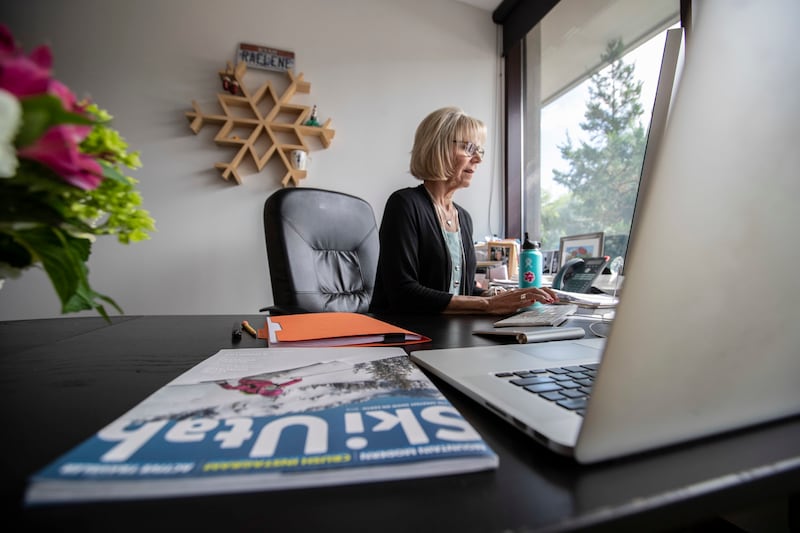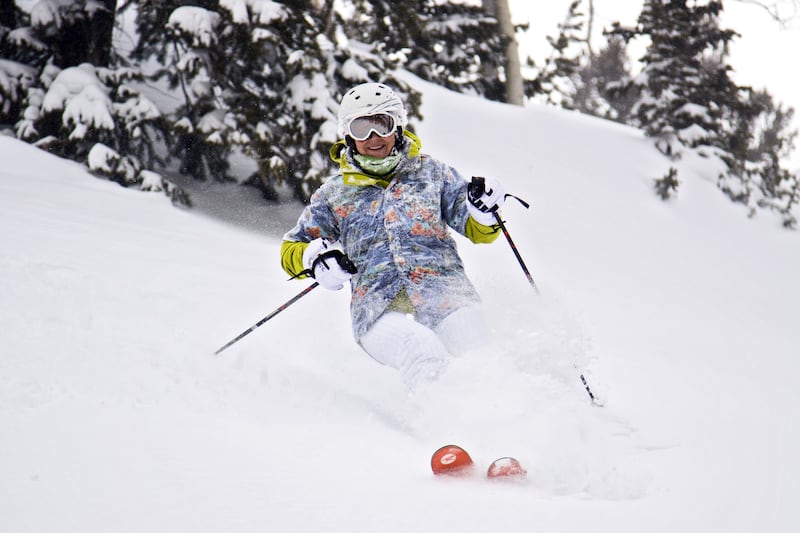SALT LAKE CITY — In promoting Utah’s skiing opportunities around the world for more than three decades, Raelene Davis has met some of the industry’s most famous and accomplished athletes, including Olympic and world champions Bode Miller, Ted Ligety, Phil and Steve Mahre, Alberto Tomba and Lindsey Vonn.
She’s met with presidents, princes and politicians, and she’s carved the state’s world-famous powder with global and religious leaders.
But ask the Vernal native to reflect on her 33-year career as Ski Utah’s director of marketing, and it isn’t those moments with the famous, the powerful or the accomplished that fill her with gratitude.
Instead, when asked about it, the mother of three and member of the Utah Tourism Hall of Fame said it might be people whose names she doesn’t even know. Her greatest satisfaction comes from their thank-you cards and hand-written notes detailing how their lives were enhanced because they were introduced to skiing or snowboarding through one of the programs she helped create.
“The one thing I’ve treasured with this job is that I like to think and hope that I made an impact on someone’s life, and maybe more than one person, through the programs here (at Ski Utah),” said Davis. “And through traveling around the world telling people about this beautiful state and encouraging them to come and see and do the things that not everyone gets to see and do.”
In helping create local and national programs that introduce children and adults to skiing and snowboarding, Davis helped the sports grow and evolve in ways that will sustain it even as recreation options continue to expand. Those efforts earned her a Lifetime Achievement Award from the North American Snowsport Journalist Association in 2014, but it is just the beginning of a long list of ways in which this mother and grandmother quietly pioneered an industry once dominated by white men.
By developing programs and continuing to expand them, she helped lure people to Utah’s mountains and exposed them to the state's unique culture and geography, from Temple Square to canyon trails to the beauty of its national parks.
“I hope I’ve played a role in someone’s life,” she said thoughtfully, “so they could enjoy the natural beauty of this great state.”
And maybe most impressively, she did it while raising three children and honoring a childhood commitment to never ski on Sunday.
'Part of the deal'
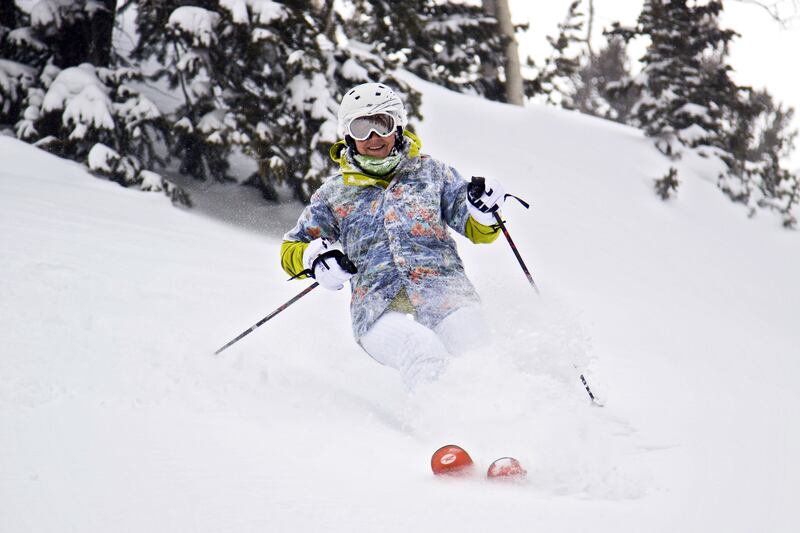
Davis, 63, spent her early childhood in Vernal, where her parents ran a grocery store.
“My extended family actually helped settle that area,” said Davis, whose family includes members of the The Church of Jesus Christ of Latter-day Saints who helped establish communities throughout rural Utah. “My mom also had an arts and craft store.”
When she was 8, her parents signed her up for ski lessons at a tiny resort near Flaming Gorge that no longer exists — Grizzly Ridge.
“No one in my family skied, but my parents felt that it was important to give their children recreational opportunities, even though they didn’t do it,” she said, laughing as she recalled the the rope tow and "state-of-the-art" lifts. “They felt that skiing was something that looked fun and exciting and that I might enjoy the rest of my life.”
Little did they know that not only would it bring her personal joy, but it would become her life’s work.
Davis attended BYU, where she was the first female photo editor of The Daily Universe, graduating in 1978. She moved to Washington, D.C., to work for the Department of the Interior, developing youth programs until her sister made a deal with a handsome young loan officer that would change Davis’ life.
“I was a deal,” she said laughing. “(He) was a mortgage loan officer and my sister was working as a Realtor in Denver. He went into her office and said, ‘I’d like to write loans for you.’ She said, ‘I’ll send you loans if you promise to take my sister out when she comes to town.’ I guess, since I was living 3,000 miles away, he thought, ‘Sure.’”
A year later, Davis drove home to Denver and arrived at her sister’s house about 10 p.m. She called the loan officer, and a bit to Davis’ surprise, he came over right away.
Four months after that August meeting, she and Lyle Davis were married in a temple.
“We’ve been married, happily married, for 33 years,” she said, noting, with some laughter, that it was his kindness and cleanliness that stood out to her. “He was extremely kind. And this might sound really terrible, but the day he wore a starched shirt with a crease in the sleeve, I was just like, this is the guy for me.”
Their discussions included whether he was comfortable with her working throughout their marriage — even after they had children.
“He was just very supportive of anything I did,” she said. “In fact, when we moved to Utah, he was the one who kept bringing me opportunities. He’d bring me the Deseret News and Salt Lake Tribune with jobs circled, including this job.”
“We had 13 resorts at the time, and so we offered a $13 lift pass, $13 lesson, $13 rental,” she said. “And 10 years later the governor (Utah) signs a proclamation declaring January ‘Learn to Ski and Snowboard’ month, and I think we are one of 11 states that do that.” – Raelene Davis
Accidental pioneer
Four months after their wedding, Davis was hired by Ski Utah on April 1, 1985, as its vice president of marketing, making her one of very few women in an industry dominated by men.
“The industry is very white and male skewed,” she said. “So it has been a challenge to be female in an all-male industry both in terms of employment and participation. But that’s definitely changed over time because there are a lot of women now, and a lot more women in the industry in leadership roles.”
Davis’ first opportunity to innovate was in 1989 as industry officials grappled with programs aimed at younger skiers and snowboarders.
“By the time kids are in high school, it was almost too late,” she said. “We did some research and found out that fourth graders were studying Utah history, which included Utah’s mountains, snow and wildlife. So we contracted with a woman to design the fourth-grade program, which taught our kids about skiing and the mountains and snow. It was part of this six-week program that, in the last week, would take the kids up and give them a lesson so they can actually see these beautiful mountains.”
What started as a pilot program at one school quickly spread to more than two dozen schools. In 1986, Colorado started a fifth-grade passport program whereby students could ski at each of the state’s resorts for free. Davis presented that idea to Utah ski resorts, all of which embraced it, eventually expanding it to a sixth-grade passport. That eventually led to the resorts offering a K-12 pass that allowed families to buy greatly reduced season passes for children.
“Skiing is not cheap,” she acknowledged. “It can be expensive, but there are some great ways for families to keep the costs down and still enjoy this wonderful sport.”
She helped shape those programs with her unique perspective as a working mother who wanted to give other people’s children the same opportunities her boys had.
But it was in 2007 that she and another ski executive — Mary Jo Tarallo — made one of the industry’s most significant moves.
“The National Ski Areas Association did a study many years ago called ‘Model for Growth’ and discovered the ski industry was flatlining,” she said. “So discussions were, What are we going to do to grow the sport? Baby boomers are aging and (their children and grandchildren) aren’t skiing as much.”
Because the NSAA was based in Denver, the group recruited a Colorado senator to sponsor legislation that designated January “Learn to Ski and Snowboard" month.
“He tried and tried and tried,” Davis said. “One day, Mary Jo (based in Washington, D.C.) and I were sitting in a coffee shop here in Salt Lake and she was telling me this story. I said, ‘Mary Jo, we don’t need legislation. We can self-proclaim this.’”
The women went to NSAA and proposed the self-designation, which 33 states signed on to support with promotions and specials that made the sport more financially accessible.
“It really took off,” she said. “That was 10 years ago (2007), and now we’ve introduced more than a million people, not just kids, to skiing and snowboarding through specials and lessons. … The beauty of the program was that it is very grassroots.”
Each state designed its own program, with Utah starting the Lucky 13 program.
“We had 13 resorts at the time, and so we offered a $13 lift pass, $13 lesson, $13 rental,” she said. “And 10 years later the governor (Utah) signs a proclamation declaring January ‘Learn to Ski and Snowboard’ month, and I think we are one of 11 states that do that.”
Juggling motherhood, honoring faith
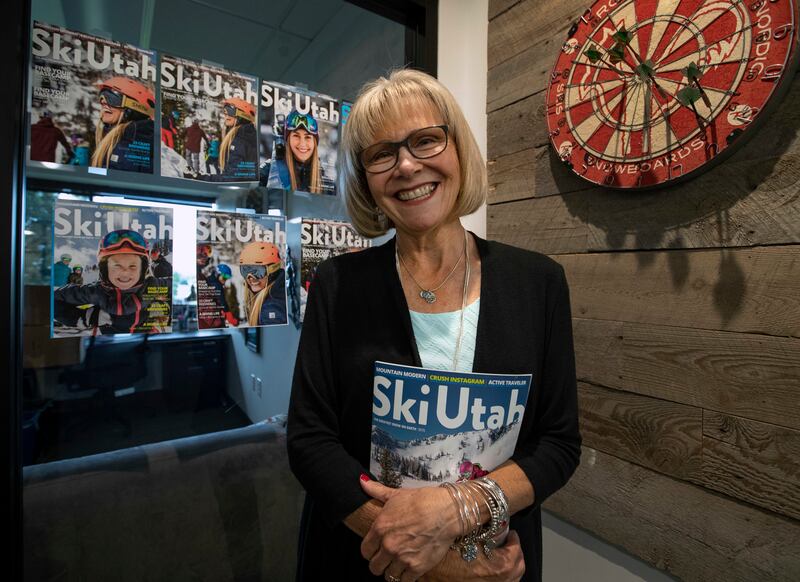
Lyle Davis set the tone for their marriage when, as they made plans to wed, Raelene asked him if she’d have to change her name.
“He looked me squarely in the eyes and said, ‘No, I like Raelene’,” she remembers, laughing. “That started a conversation about, ‘How do you feel about me working?’ … There was discussion, but there was no discussion of ‘Why you're quitting’ … It was how are we going to make this work? You have a career. I have a career. How are we going to make it work?”
Both Lyle and Raelene were raised by mothers who worked outside the home. So when the first of their three sons arrived three years later, conversations were about how the family would adjust.
“A lot of the challenges back in the '80s and early '90s and having children was that you didn’t take your children with you like you do today,” she said. “You didn’t talk about your children at work, and you certainly didn’t take them to work with you.”
Davis volunteered to be ‘team photographer’ for the sports teams her boys competed on in high school, and she made it a point to make it to games and important events. She and her husband feel good about their decisions, and she appreciates she's had such a rewarding personal career and happy family life.
That doesn’t mean she didn’t wrestle with the seemingly universal guilt mothers feel because they can’t do it all.
“Sometimes I have guilt because I’m Italian, I’m a woman and I’m LDS,” she said smiling. “I do have guilt. I wonder, Did I do the right thing? Yeah, I missed out on some things that would have been fun to have been there every step of the way. However, I justify it because my children might not have turned out to be as good as they turned out to be if I had been there every step of the way. … I would like to think I was there as much as I could have been.”
Juggling the demands of motherhood was just one of the challenges she faced as she made her mark on the male-dominated industry. As all ski resorts face more and more competition for the leisure time and money of potential customers, Utah resorts have the unique challenge of marketing to a large local clientele, many of whom won’t ski on Sunday.
Davis understands because that’s a commitment she made as a young girl.
“In the 33 years I have been at Ski Utah, I have been faced with the skiing on Sunday issue — and temptation, especially on sunny powder days — many times,” she said. “But each time, I have been able to keep my promise and never ski on Sunday.”
Future of the industry
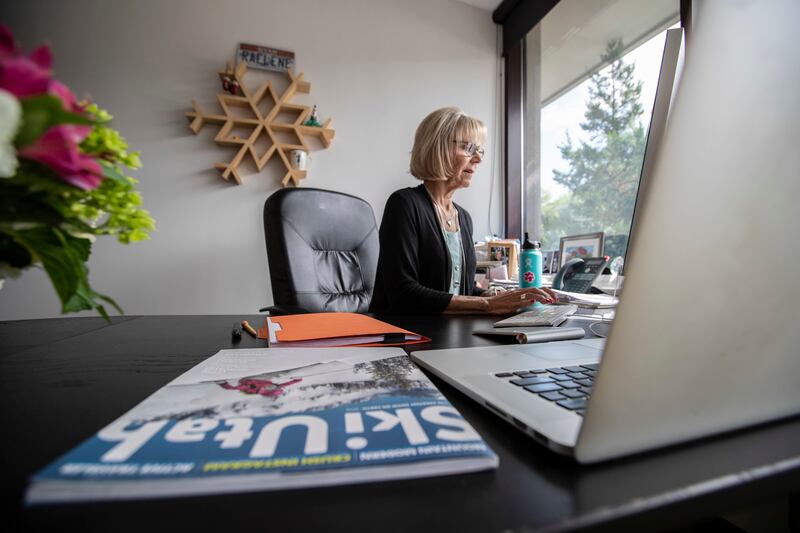
The ski industry is facing some unique and difficult challenges, and Davis sees them as critical to address, both locally and nationally.
“It’s definitely changed over time because there are a lot more women in the industry in leadership roles now,” she said. “We have a general manager of a resort who is a woman, and that was never the case. We have a woman who is over the National Ski Association, and I didn’t think I would ever see that in my lifetime.”
Longterm, she sees three main issues.
“If I had to say three things as an industry (one) would be global warming. One would be transportation issues — the congestion going up and down Big Cottonwood — and the other would be the decline of the baby boomer because they ski more and the uprising of the millennials and the diversity issue because skiing is, or has been, kind of white, very white and very male skewed. So those are long-term issues.”
In the short term, she sees the greatest barriers being the increasingly difficult challenge of competing for the limited amount of free time people have and dwindling recreational dollars.
“We have challenges here in Utah that other states don’t have because you’re basically down to one weekend day … and sometimes you have to make a choice between recreating or doing chores. So that’s the challenge.”
But if anyone is up for the challenge, it’s the woman who has approached challenges with the tenacity and innovation of a working mom determined to turn roadblocks into new opportunities.

